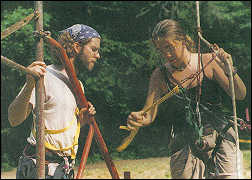Raising a Ruckus
Learning How to Monkey-Wrench at Direct Action Camp
Being an effective rabble-rouser takes more than fearlessness and commitment to the cause. It also takes skill, say the environmental graybeards at The Ruckus Society.
Ruckus was founded in 1995 by two civil disobedience giants, Mike Roselle of Earth First! and Rainforest Action Network fame, and former skipper Howard “Twilly” Cannon of the Greenpeace French and Russian anti-nuclear campaigns. The primary goal of Ruckus is to encourage the proliferation of skilled, non-violent, direct-action activists worldwide; in addition to providing technical assistance to campaigns across the continent, Ruckus has initiated a series of loosely-styled direct-action training camps. The five- to seven-day camps-held in locations as diverse as Malibu, California, Darby, Montana, and the North Rim of the Grand Canyon-are a kaleidoscope of intense climbing instruction, open-air seminars and communal bonding.
The 1997 National Camp, the year’s largest, saw the convergence of some 150 trainers, support personnel, and participants (Ruckus’ emphasis of skill-sharing on all levels has organizers reluctant to use terms like “students” or “trainees”) at Pepperland, a 65-acre privately-owned spread nestled in the mountains of southwestern North Carolina. For seven days, attendees ran the paces of 15-hour schedules that featured daytime workshops and evening presentations.
A typical day begins at 7 a.m., when campers strewn in tents along a one-mile trail wake up to a conch-shell blast as in Lord of the Flies. By the time the last stragglers make their way to the tarp-covered kitchen area for a vegetarian breakfast, most of the camp has gathered around coordinator John Sellers for the morning circle. After a series of announcements concerning first aid, hygiene (by the end of the week, Nurse Butch from Missoula has the crowd chanting “Wash your hands!” in unison) and kitchen-help recruiting, half the attendees are sent afield for a four-hour climbing lesson while the others remain for a classroom-type seminar.


Ruckus camps emphasize skill-sharing as well as technical training—like skyscraper rappeling
and tree climbing—to publicize environmental messages. Photos by Lilace Mellin.
The climbers alternate between two training areas, trees and scaffolding. In the trees, instructors encourage their charges to intimately bond with the white pines and hickories they ascend via the trunk-straddling “stirrup” method. “If you don’t end up all sweaty and grimy, with bark sticking all over you, then you’re doing something wrong,” says climb trainer J.C. Callender. Once aloft, campers learn to set anchors, switch to rappel, and hang platforms-essential skills in the front-line tactic of becoming a human obstacle between a bark-skinned friend and a hungry chainsaw.
Six stories of scaffolding serve to simulate the buildings and bridges that direct-action proponents view as prime locations for attention-grabbing banners. But despite repeated acknowledgments of the inherent value in performing direct actions-ranging from the temporary halt of anti-environment activity to the formation of an emotional bond with the issue at hand-Ruckus is adamant in stressing the need for the action to showcase a polished and concise message. “If you don’t know the image that your action conveys, you have not done your homework,” Ruckus media trainer Bill Walker exhorts during the media seminar. Walker, currently the director of the California chapter of the Washington-based Environmental Working Group think tank, is a dynamic speaker who served 13 years as a print journalist before joining the environmental fray seven years ago. “You must earn legitimacy in the public eye by being in command of the facts and in control of the message,” he says.
Along with media savvy, the seminars teach campers principles of non-violence, confrontation de-escalation tactics, action scouting and planning, blockade methods, political theater, action support, and the expected legal ramifications of direct action. On this last point, Roselle offers the group a bit of hard-won experience: “Most of the time, when you get in jail, everyone will act like you’re not there. And believe me, that’s cool. Groove with that,” he deadpans to a burst of laughter.
On the camp’s last day, participants get the chance to put their new skills to the test. In an exercise termed “cops and loggers,” trainers take various roles as police, media and irate workers as campers stage actions in the trees and scaffolding. The mock actions are followed by an extended debriefing in which the nuances of the actions are broken down and evaluated by the group.
As important as the skill-sharing is, says Cannon, Ruckus is also about fostering a sense of community within the movement. “We subscribe to the big-tent theory,” he says, noting that participants and volunteer trainers are from such diverse groups as Greenpeace, Earth First!, and the Native Forest Network. (The Carolina camp also featured Nigerian activist Robert Aziboala, who worked with Ken Saro-Wiwa before Saro-Wiwa’s execution by the Nigerian government in 1995.)
Among those safely under the canvas with Ruckus is the Rainforest Action Network, one of the world’s most prominent direct-action groups. “We have the utmost respect for Ruckus,” says Mark Westlund, RAN’s communications director. “What they’re doing is incredibly valuable. A number of our successful actions over the past several years involved Ruckus alumni, and most of my staff has now been through a camp.”
Even some groups outside the direct-action tent are giving Ruckus their tacit support. Bruce Hamilton, the Sierra Club’s director of conservation, is respectful. “Although it’s not something we advocate or participate in,” he says, “we understand that there are people whose conscience leads them to break the law when the avenues of court and Congress fail. If they see land they hold sacred desecrated, we know why they chain themselves to trees or bulldozers.”
Ruckus’ future plans include as many camps as funding will allow (participants are not charged for attending) and the publication of a tome covering all aspects of direct actions. “It’s going to be the direct-action bible,” says Cannon. And as the approximately 500 Ruckus graduates could tell you, the ranks of the converted continue to grow.

